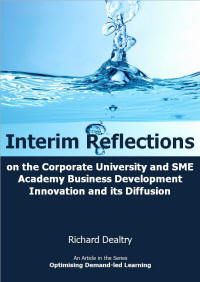Interim Findings Concerning Progress, Empirical Research & Innovating Corporate University Applications
This article follows the earlier publication entitled “ECUANET – the European Corporate Universities and Academies Transnational Best Practice Network”.
Purpose:
The purpose of this paper is to reflect on and inform about learning points from this two-year duration best practice action research and transnational networking project as it approaches its final stage.
It comments upon the interim findings concerning project progress, the empirical research process and factors shaping current innovative corporate university pioneering applications for the effective and efficient management of quality lifelong learning going forward into the future.
The full ECUANET project report with detailed analysis and recommendations will be published in January 2008.
Design / Methodology / Approach:
This article has been designed to assist the process of reflection and assimilation of information and experience on a major European project leading up to the final project report. It explicates the key positive and obfuscating dynamics that the project team have had to, and will have to conjure with, in reaching its recommendations about the evolution of best practice in corporate university and enterprise academy design and management.
The project partners have operated a voluntary or self-selection process in their recruitment of corporate partner organizations to participate in the project action research case study work.
The research methodology was based upon the corporate university blueprint architecture and browser toolkit to provide depth in practice evidence and a searchable database for comparative case to case practice evaluation of the key performance indicators (KPIs).
Interim Findings:
It was found that the corporate university organization and business development concept is a subject area which is either well understood by company management and education institutions or there is considerable confusion about its role and purpose. This comment does not apply comfortably and consistently universally as there are very different states of maturity, adoption and interpretation in the concept’s development and practice across the world region by region.
From a wide and diverse portfolio of companies and organizations who were invited to participate in the action research case studies, those who accepted have one very important characteristic in common: they are all intensively engaged in managing a major innovation, i.e. they already have the commitment and fortitude to making new ideas work in practice.
As previously reported in this journal, it is confirmed by the experience of this project that to be successful in this turbulent era of intensive new learning management, it requires continuous commitment to engendering innovation diffusion in both strategic and tactically inspired new learning process management. In addition, it also demands serious reflection about the creative nature of the learning leadership role and also the style of its management.
Practical implications:
The results of the project at this stage show that a successful corporate university intervention needs to be founded upon a sustainable commitment by top management and they should promote, if they do not already have it themselves, the spirit of curiosity; to find out better ways of doing business today and in the future. It requires an in-depth understanding of the organization’s strategic learning needs going forward, good knowledge of the models of corporate university development that are available and reliable, the gaps that exist in matrix skills and competencies at all levels and the detailed planning of all resource strands.
Originality/value:
The a priori browser-based corporate university blueprint model architecture employed in the empirical case study research mode proved to have both the depth and flexibility to provide a high-quality evaluative framework and capture all the dynamics relating to the key variables in good corporate university design and management. The database of case foundation information, key performance indicators (KPIs) and best practice outcomes will be one of the most comprehensive and world-class quality reference sources published to date.
The individual variables that make up the portfolios of emergent best practices – process and management – have originality and value both individually and collectively. The impact of these best practice ways of working will have far-reaching consequences for leadership and the future shape of lifelong interdependent learning between employers and employees and policy in government departments and educational institutions.
An overview assessment is also made on the positioning of the corporate university concept on the innovation adoption curve.
Click To View Abstracts From Our Articles Below
Research Reports:
- Frequently asked questions with reference to the corporate university
- Case research into corporate university developments
- Case research into the evolution of a corporate university development process
- Envisioning development
- ECUANET – European Corporate Academies Transnational Best Practice Network
- Interim reflections on the corporate university and SME academy business development innovation and its diffusion
- Moving towards optimising demand-led learning – the 2005-2007 ECUANET Leonardo Da Vinci project
Strategic Management:
- Strategic directions in the management of the corporate university paradigm
- Managing intellectual leadership in corporate value
- The real-time corporate university becomes a reality
- The savvy learner
- Integrating programme and process performance QA
- Global corporate priorities and demand-led strategies
Managing Design Parameters:
- Managing the corporate university learning curve
- Establishing a methodology for appraising the strategic potential of the corporate university
- Configuring the corporate university – managing a portfolio of thinking schools
- How to configure the corporate university for success
- Issues relating to learning accreditation in corporate university management
- Design and management of an organization’s lifelong learning curriculum
Best Practice Management:
- Engendering corporate scholarship for top level management performance
- Managing the transition to the corporate university – a synthesis of client research
- Managing the issue of learning relevance in the formulation of corporate learning strategies
- Managing the corporate university watershed
- The new generation of corporate universities – co-creating sustainable enterprise and business development solutions
- The corporate university’s role in managing an epoch in learning organization innovation
- Configuring the structure and administration of learning management
- Exploration of a contextual management framework for strategic learning alliances
- Hunting goodwill along the intellectual equity trail




